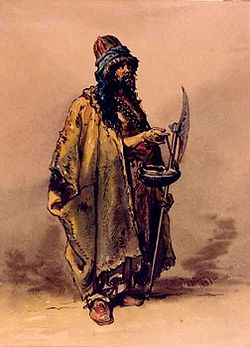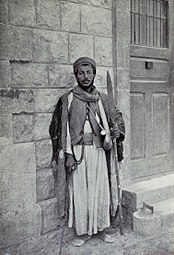
Darvesh [1] or Dervish ( from Persian: درویش ), as it is known in European languages, refers to members of Sufi Muslim ascetic religious Tariqah, known for their extreme poverty and austerity, similar to mendicant friars in Christianity or Hindu/Buddhist/Jain sadhus, also called fakirs amongst Muslims [1].
Dar in Persian means 'a door', so Darvesh literally means 'the one who goes from door to door' [1]. The term comes from the Persian word Darvīsh[2] (درویش), which usually refers to a mendicant ascetic. This latter word is also used to refer to an unflappable or ascetic temperament (as in the Urdu phrase darwaishana thabiyath for an ascetic temperament); that is, for an attitude that is indifferent to material possessions and the like.
As Sufi practitioners, dervishes were known as a source of wisdom, medicine, poetry, enlightenment, and witticisms. For example, Mollah Nasr-ad-Din (Mulla Nasrudin, Nasreddin Hoja) had become a legend in the Near East and the Indian subcontinent, not only among the Muslims.
Religious practice
Many dervishes are mendicant ascetics who have taken the vow of poverty, unlike mullahs. The main reason why they beg is to learn humility, but dervishes are prohibited to beg for their own good. They have to give the collected money to other poor people. Others work in common professions; Egyptian Qadiriyya – known in Turkey as Kadiri – for example, are fishermen. Rifa'iyyah dervishes travelled and spread into North Africa, Turkey, The Balkans, Iran, India, Afghanistan and Tajikistan.There are also various dervish groups (Sufi orders), almost all of which trace their origins from various Muslim saints and teachers, especially Ali and Abu Bakr. Various orders and suborders have appeared and disappeared over the centuries.

Mevlâna mausoleum, Konya, Turkey
The whirling dance or sufi whirling that is proverbially associated with dervishes, is the practice of the Mevlevi Order in Turkey, and is just one of the physical methods used to try to reach religious ecstasy (majdhb, fana). The name "Mevlevi" comes from the Turkic (Horasani) poet, Rumi, whose shrine is in Turkey and who was a Dervish himself.
This practice, though not intended as entertainment, has become a tourist attraction in Turkey.
Other groups include the Bektashis, connected to the janissaries, and Senussi, who are rather orthodox in their beliefs. Other fraternities and subgroups chant verses of the Qur'an, play drums or dance vigorously in groups, all according to their specific traditions. Some practice quiet meditation, as is the case with most of the Sufi orders in South Asia, many of whom owe allegiance to, or were influenced by, the Chishti order. Each fraternity uses its own garb and methods of acceptance and initiation, some of which may be rather severe.Historical and political use
Various western historical writers have sometimes used the term dervish rather loosely, linking it to, among other things, the Mahdist uprising in Sudan, Mohammed Abdullah Hassan's ("Mad Mullah") 1920 conflict with British forces in Somalia and other rebellions against colonial powers.
Begging
While commonly the term dervish is used to describe beggars, Dr. Youness Afroukhteh makes a differentiation between dervishes and common beggars:
While they walk around praising the Lord, anyone according to his own desire may voluntarily drop some coins in it (a kashkul)... a real dervish who wears the proper robe and carries the kashkul does not beg, nor does he make any demands.[3]
References
- ^ a b c Darvesh - Dictionary of Islam
- ^ http://www.m-w.com/dictionary/Dervish
- ^ *Afroukhteh, Dr. Youness (2003) [1952]. Memories of Nine Years in 'Akká. Oxford, UK: George Ronald. ISBN 0853984778.




